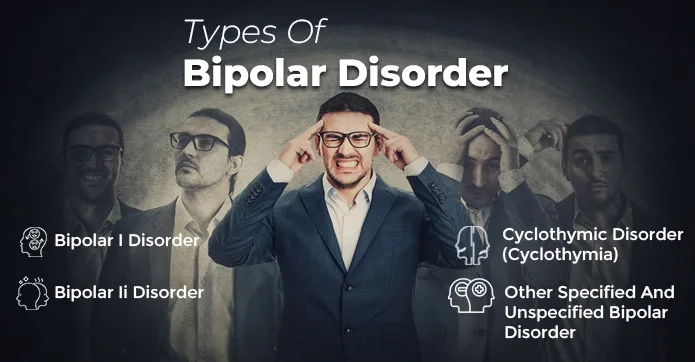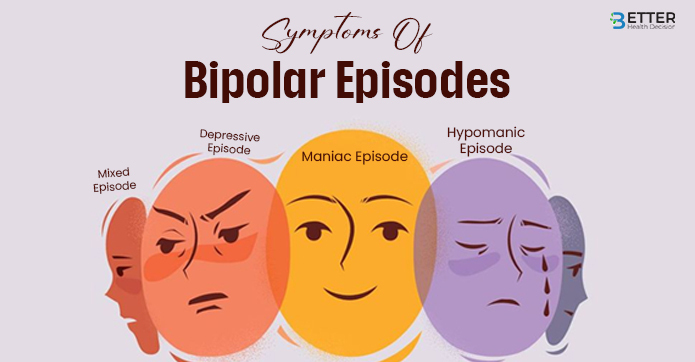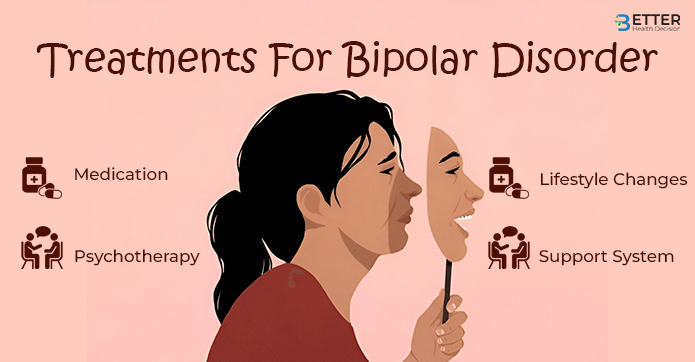Bipolar disorder is a mental health condition in which a person suffers from extreme mood swings leading from mania(high energy levels and happy mood) to depression(low energy and sadness). The sudden change in mood can impact your daily routine, personal life, and other areas and hinder your personal and professional growth. It affects all people regardless of gender, and on average, its symptoms start from the age of 25.
However, the exact reason behind bipolar disorder is unknown. It can be genetic; even your surroundings and biological reasons can contribute to its development. The brain structure and the imbalance of neurotransmitters also play vital roles in causing this disorder. Sudden excitement, impulsive behavior, high energy levels during mania, sudden sadness, suicidal tendencies, and fatigue are some common symptoms of bipolar disorder.
In this blog, we will learn about bipolar disorder, its causes and symptoms, and help you learn more about this in a detailed way.
Types Of Bipolar Disorder

Bipolar can be characterised mainly into three types: bipolar I, bipolar II, and cyclothymia. Observing your symptoms and discussing them with your professional healthcare provider can help you understand them better, and your doctor can help you identify the type of your disorder during diagnosis.
Some people experience extreme mood swings, and their symptoms do not match these three categories. In such rare cases, the condition may be diagnosed as “Other Specified Bipolar and Related Disorders” or “Unspecified Bipolar and Related Disorders.”
1- Bipolar I Disorder
Bipolar 1 disorder is characterised by the appearance of one maniac episode lasting for a week. You may experience excessive depression but less than manic episodes and don’t require a diagnosis. Maniac episodes can be severe, and sometimes, this severity can lead to psychotic symptoms.
2- Bipolar Ii Disorder
In Bipolar II, individuals experience one hypomanic episode, which is a milder form of mania that lasts for about 4-5 days. Depressive episodes are more frequent and severe as compared to Bipolar I disorder. Hypomania does not cause severe impairment or psychotic symptoms.
3- Cyclothymic Disorder(Cyclothymia)
Individuals with cyclothymia experience chronic mood fluctuations with numerous periods of hypomanic and depressive symptoms. However, they are not so severe that they can be characterised as hypomania or depression. These episodes are shorter in duration and less severe as compared to bipolar I or Bipolar II disorder. Many individuals with this condition may experience periods of stable mood lasting one to two months between episodes.
4- Other Specified And Unspecified Bipolar Disorder
In this category, cases do not fully meet the criteria for Bipolar I, Bipolar II, or Cyclothymia but still experience mood disturbance. These can be short-term hypomanic episodes or mood fluctuations triggered by external factors.
Symptoms Of Bipolar Episodes

The symptoms of Bipolar disorder vary depending on the severity of the condition.
| Mood Episodes | Common Symptoms |
| Maniac Episode | High energy, restlessnessSleep deprivationRestless mind and rapid speechImpulsive or risky behaviorArroganceLow concentration |
| Hypomanic Episode | Severe to mania but less severeIncreased energy and activityEnhance creativity and productivityMild impulsivityDoes not cause significant impairment |
| Depressive Episode | Persistent sadness or hopelessnessFatigue or low-energyInsomnia or excessive sleepDifficulty concentratingNo interest in activitiesFeeling of guilt or worthlessnessSuicidal thoughts |
| Mixed Episode | Symptoms of mania and depression occurring at the same timeHigh energy with the feeling of hopelessnessIncreased irritability and emotional instabilityRacing thoughts, along with fatigue or low motivation |
Causes Of Bipolar Symptoms
Bipolar disorder is a complex mental health condition, and there is no specific reason for this condition. Several factors are responsible for this disorder, including brain chemistry, genetic predisposition, societal factors, and lifestyle. The exact cause remains unknown, but studies have shown that these factors are very much responsible for this mental condition.
1- Genetic Factors
- Family History: Individuals who have a family history of bipolar disorder are at very high risk of getting this order from any of their parents.
- Genetic Variations: There is no specific gene responsible for causing this bipolar disorder, but multiple genes are more likely responsible for causing this mental disorder.
- Twin Studies: Identical twins have a higher chance of developing bipolar disorder as compared to non-identical twins, supporting the role of genetics.
2- Brain Structure And Neurochemical Imbalance
- Neurotransmitter Dysfunction: An imbalance in neurotransmitters such as dopamine, serotonin, and norepinephrine can regulate your mood, resulting in mood swings and irritability.
- Brain Structure Abnormalities: Studies have shown that individuals with bipolar disorder have differences in the prefrontal cortex, amygdala, and hippocampus, which are responsible for regulating emotion and impulse control.
- Changes In Brain Connectivity: Proper neural function is vital in brain functioning; any disruption in neural communication can affect different brain regions, mood regulation, and cognitive function.
3 – Hormonal Imbalance
1- Cortisol Levels: An increase in the level of cortisol(the stress hormone) may trigger brain functionality, worsening bipolar symptoms.
2- Thyroid Dysfunction: Thyroid abnormality can result in mood swings, resulting in bipolar disorder progression.
4- Environmental And Psychological Factors
1-Societal Pressure: Sometimes, societal pressure, like discrimination and other factors like gender inequality, can also lead to mental instability, causing bipolar disorder.
2- Stressful Life Events: Childhood abuse, physical trauma, emotional neglect, or the loss of a loved one can also affect individuals internally, contributing to the onset of bipolar disorder.
3 – Substance Abuse: drug abuse like cocaine and alcohol can cause changes in the brain structure, leading to depression and manic episodes.
5 – Sleep Disruptions
Insomnia, irregular sleep patterns, or frequent sleep disruptions can cause irritability and exhaustion and regulate mood, worsening bipolar symptoms.
6-Inflammatory And Autoimmune Factors
– Inflammation causes neurotransmitter imbalance, worsening bipolar disorders.
-Autoimmune factors can cause anxiety and depression that affect your mood stability and increase irritation and mood swings.
Diagnosis Of Bipolar Disorder
Diagnosis of Bipolar disorder is based on the severity, medical history, and psychological evaluation. Bipolar disorder develops slowly and gradually; sometimes, symptoms are not even visible, but the person starts acting weirdly. There is no particular test to identify the mental health of the person. Still, doctors follow specific processes to confirm if a person is suffering from bipolar disorder or if it’s just a mood swing.
1-Clinical Evaluation
Usually, there are changes in the individual’s behavior, and he starts acting more aggressively, or there are sudden changes in the person’s habits. In that case, the person is advised to consult a good psychiatrist or mental health professional.
- He will ask some questions about your mood swings,sleep patterns, and daily life to know what changes are occurring in your personality.
- Then, he will examine your condition to see if you had a maniac, hypomanic, or depressive episode based on your condition.
- He will ask about your family history; if bipolar disorder runs in your family, it can be genetic.
- Examine your mental health if you are suffering from anxiety or depression because that can also cause irritability in one’s behavior.
2- Dsm-5 Diagnostic Criteria
Doctors use the Diagnostic and Statistical Manual of Mental Disorders (DSM-5) to confirm a diagnosis to identify which bipolar disorder you are suffering from.
-Bipolar 1 Disorder
- The person feels very high energy levels, disturbed sleep, impulsive behavior, and at least one maniac episode.
- During this frame, a person feels anxiety or can have a depressive mood, but it is not necessary.
-Bipolar Disorder II
- At least one hypomanic episode in which there are signs of mild mania or specific changes in regular behavior.
-Cyclothymic Disorder
- In this condition, a person will have regular mood swings, a little bit of hypomania, or mild depression lasting for at least 2 years.
- These symptoms are very mild but can not be diagnosed as bipolar 1 or bipolar 2 disorder.
3 – Medical Test
Sometimes, behavior symptoms are not apparent after regular checkups, so your health professional will perform some medical tests to confirm the symptoms in that condition. These tests include:
– Blood Test: A blood test detects thyroid problems, vitamin deficiencies, or drug effects on the brain.
– Brain Scans(MRI/CT Scans): This test is used if symptoms are severe and to understand brain condition.
– Substance Use Test: This test determines the presence of drugs in your body or blood that can regulate your mood.
Treatments For Bipolar Disorder

Although bipolar disorder is a lifelong condition, treatment is required to lower the severity and symptoms.
1. Medication
- Mood Stabilizers: certain medicines like Valporate, lithium, and carbamazepine work as mood regulators and help stabilise your mood.
- Antipsychotics: Medicines like olanzapine or quetiapine help in controlling depression and manic episodes.
- Antidepressants: These are used to treat depressive moods and are advised by the health professional with the combination of mood stabilisers.
2. Psychotherapy
- Cognitive Behavioral Therapy (CBT): This therapy helps identify negative patterns in individuals and helps them develop coping strategies.
- Interpersonal and Social Rhythm Therapy (IPSRT): This helps an individual perform daily tasks effortlessly by reducing depression and anxiety.
3. Lifestyle Changes
- Maintaining a regular sleep schedule
- Engaging in regular physical exercise
- Managing stress through mindfulness and relaxation techniques
- Avoiding drugs and alcohol, which can trigger mood episodes
4. Support System
- Support from family, friends, and mental health professionals is crucial in managing bipolar disorder.
- Joining support groups can provide shared experiences and coping strategies.
Potential Risk Factors For Bipolar Disorder
A single factor does not cause bipolar disorder; there are many factors responsible that contribute to its development.
-Biological And Genetic Factors
- Family History– Genes history plays a vital role in one’s medical condition; having a close relative with bipolar disorder increases its risk.
- Brain Structure And Function: Differences in brain chemistry and neural pathways lead to brain structure abnormalities that can regulate your mood and affect overall brain functioning.
- Neurotransmitter Imbalance: Abnormal dopamine, serotonin, and norepinephrine irregularities affect our mood regulation.
-Environmental And Lifestyle
- Stressful Life Events: incidents that have left a long-lasting impression on one life can also trigger bipolar episodes like abuse, trauma, or losing a loved one.
- Substance Use: alcohol or drug abuse or consumption further worsens the disorder’s symptoms.
- Lack of sleep: Sleep disturbance affects our mood, making us more irritable and triggering manic and depressive episodes.
-Psychological And Emotional Factors
- Childhood Trauma: physical, emotional, or sexual abuse in childhood can also affect the mental health of an individual, contributing to bipolar disorder development.
- Stress And Anxiety: chronic stress can increase vulnerability to mood swings.
- Poor Coping Mechanism: difficulty in managing emotion and self-isolation can also trigger mood instability.
-Hormonal And Medical Factors
- Thyroid Imbalance: Thyroid affects our mood, leading to depression or anxiety.
- Inflammation And Immune System Dysfunction: according to some studies, inflammation and the immune system directly affect our mood, leading to mood disorders.
- Head Injury: It can affect brain structure and be a contributing factor depending on the severity of the injury.
Is Bipolar Disorder And Schizophrenia The Same?
Bipolar disorder and schizophrenia are different from each other, but some symptoms are pretty similar in both conditions. Bipolar disorder affects individual moods and causes anxiety and depression, whereas, as in schizophrenia, a person suffers from short term memory loss that affects thinking, leading to hallucinations, delusions, and disorganized thoughts. But specific symptoms are common in both conditions, like delusion. Bipolar affects an individual’s mood, whereas schizophrenia impacts an individual’s thought and thinking ability.
How Bipolar Disorder Affects Different Genders And Children?
Impact On Men
- More likely to experience severe manic episodes.
- Higher risk of substance abuse and impulsive behavior.
- Less likely to seek treatment, leading to delayed diagnosis.
- More frequent aggressive or risk-taking behaviors during mania.
Impact On Women
- More likely to experience Bipolar II disorder( more depressive episodes than mania)
- Hormonal changes (menstruation, pregnancy, menopause) can worsen the symptoms.
- Frequent mood swings
- Higher levels of anxiety or eating disorders.
Impact On Children
- Increased irritability, aggression, and frequent mood swings.
- More difficulty with school performance and social interactions.
- Higher risk of misdiagnosis (often mistaken for ADHD or behavioural disorders).
- More likely to have explosive outbursts and extreme emotional reactions.
- If untreated, it can lead to academic struggles, risky behaviours, and substance use in teens.
How To Cope And Seek Help While Dealing With Bipolar Disorder
If you notice symptoms of bipolar disorder, the first and most crucial step is to reach out to a doctor or therapist as soon as possible. If a loved one is showing signs, encourage them to seek help and remind them that you understand and support them. Treatment can help manage mood episodes and their effects, and building a strong care team can make a big difference. Your care team may include your primary doctor, a psychiatrist to manage medications, a therapist for talk therapy, and other specialists like sleep experts, acupuncturists, or support groups. Since treatment varies from person to person, it may take time to find the right approach. Some people respond well to medication, while others benefit more from therapy. It’s essential to be open with your care team about what works and what doesn’t. Don’t hesitate to speak up if something isn’t helping or makes you feel worse. Remember, bipolar disorder isn’t your fault—it’s not caused by anything you did or didn’t do. Feeling frustrated when treatment doesn’t seem to work is normal, but patience and self-compassion are key. Give yourself time, trust the process, and treat yourself kindly as you explore different approaches.
Overview
Bipolar disorder is a lifelong condition and is incurable, but it doesn’t mean that you can not enjoy your life. Living with bipolar disorder can be challenging, but following a proper treatment plan, practicing a self-care routine, and getting support from your loved ones can reduce the symptoms and enhance your overall well-being. Make yourself and your loved ones more aware of this condition to prevent it.
Most Asked Question
1- Does one mania or manic episode mean they will occur frequently?
It is not necessary. A single manic episode can increase the risk of further episodes. Still, if treated correctly and with a healthy lifestyle, frequent reoccurrence can be managed and decrease the chances of relapse.
2- Is bipolar disorder curable?
Bipolar disorder is not curable but can be managed with the right treatment. Proper medication therapies and lifestyle changes help in controlling mood swings and relieving depression and anxiety.
3- Can a person with bipolar disorder live an everyday life?
Yes, a person with bipolar disorder can live an everyday and stable life with proper treatment, family support, and self-care.
4- Why is bipolar disorder not curable?
Bipolar disorder is a chronic condition and is linked to genetics, brain chemistry, and environmental factors. These causes can not be removed permanently, making this disorder incurable. Treatment and medication help in easing mood swings and mania episodes, but stopping treatment can lead to relapse.
5- What is the end stage of bipolar disorder?
Severe, frequent mood episodes, cognitive issues, and difficulty in daily life mark the end stage of bipolar disorder. It can result from untreated or long-term illness, leading to the decline of emotional and physical health.
6- At what stage does bipolar disorder start?
It can occur in 25-year-olds or later. In early childhood, there are very rare chances of developing this disorder.

